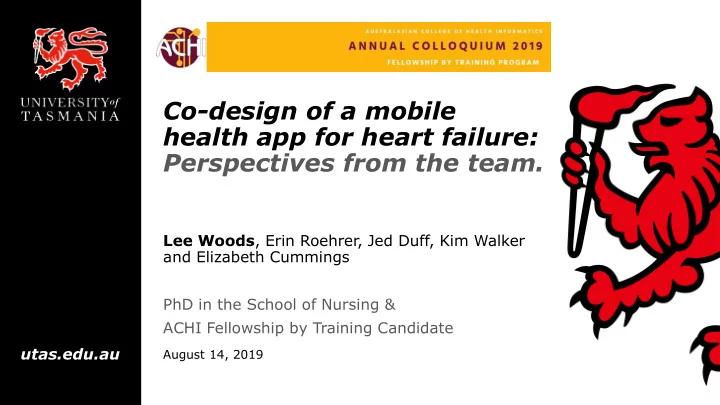

Co-design of a mobile health app for heart failure: Perspectives from the team. Lee Woods , Erin Roehrer, Jed Duff, Kim Walker and Elizabeth Cummings PhD in the School of Nursing & ACHI Fellowship by Training Candidate utas.edu.au August 14, 2019
Overview Evaluation of the co-design processes enlisted to develop a mobile health app ▪ Stakeholder involvement ▪ Methods – Design Thinking, post-it notes ▪ Key findings and key learnings ▪
Research objectives Co-design process
Research objectives Design outcome Co-design process
Stakeholder involvement the co-design
Stakeholder involvement the co-design
Stakeholder involvement the co-design Sprint: Solve Big Problems and Test New Ideas in Just Five Days Jake Knapp 2016
Stakeholder involvement the co-design
Method 3 patients (of 7 involved in the co-design) Participants 1 family member (of 4) 7 clinicians (of 7)
Method Brain storm Data collection What do you think of the app? Would you recommend/use the app? = THOUGHT Innovating for People: Handbook of Human-Centered Design Methods LUMA Institute 2012
Method Analysis
Co-design process Key findings Successes ▪ Structured approach with regular feedback ▪ Involving many stakeholders ▪ Quick, flexible co-design activities ▪ Clinicians – participation was a research engagement opportunity ▪ Patients/family – participation was an opportunity to give back
Co-design process Key findings Successes Failures ▪ ▪ Structured approach with regular feedback Inadequately diverse stakeholders ▪ ▪ Involving many stakeholders Not reviewing comparable health apps ▪ ▪ Quick, flexible co-design activities Not adequately addressing the app’s implementation ▪ Clinicians – participation was a research engagement opportunity ▪ Patients/family – participation was an opportunity to give back
Co-design outcome Key findings ▪ Surprised ‘the app came to life’ ‘all that was discussed came true’ ▪ 10 of 11 would recommend/use the app ‘younger generation’ ‘a while to get used to it’
Co-design outcome Key findings ▪ Surprised ‘the app came to life’ ‘all that was discussed came true’ ▪ 10 of 11 would recommend/use the app ‘younger generation’ ‘a while to get used to it’ ▪ Supportive tool for meaningful self-monitoring ‘simple, easy to use’ ‘able to self - track’ … but may be ‘too much’ ▪ Relevant ‘all stored together’ ‘improve time management and communication’
Key learnings 1. Using a structured approach to innovation, local app design and development can be achieved by clinicians and patients ▪ Highly successful – Efficient to be effective! ▪ (Incorporate an implementation plan)
Key learnings 1. Using a structured approach to innovation, local app design and development can be achieved by clinicians and patients ▪ Highly successful – Efficient to be effective! ▪ (Incorporate an implementation plan) 2. Executing a co-design project is about stakeholder management ▪ Renegotiation of roles – Bust power imbalances ▪ Stakeholder selection – Quality over quantity ▪ Those involved are loyal to the outcomes – Test with uninitiated end-users
Acknowledgements PhD supervisors Funding partners ACHI FbT Program ▪ Liz Cummings ▪ Kim Walker ▪ Jed Duff ▪ Erin Roehrer
Recommend
More recommend